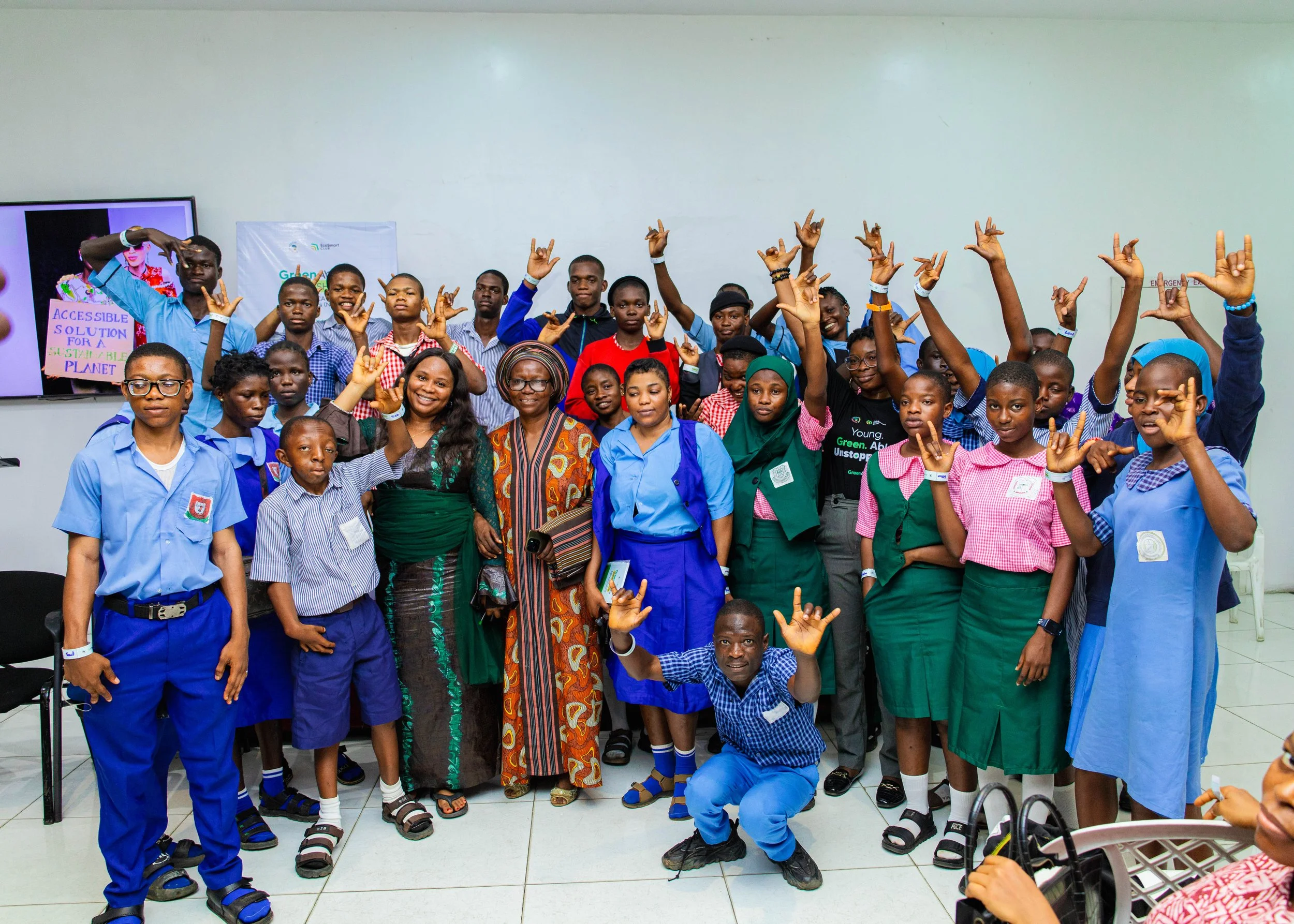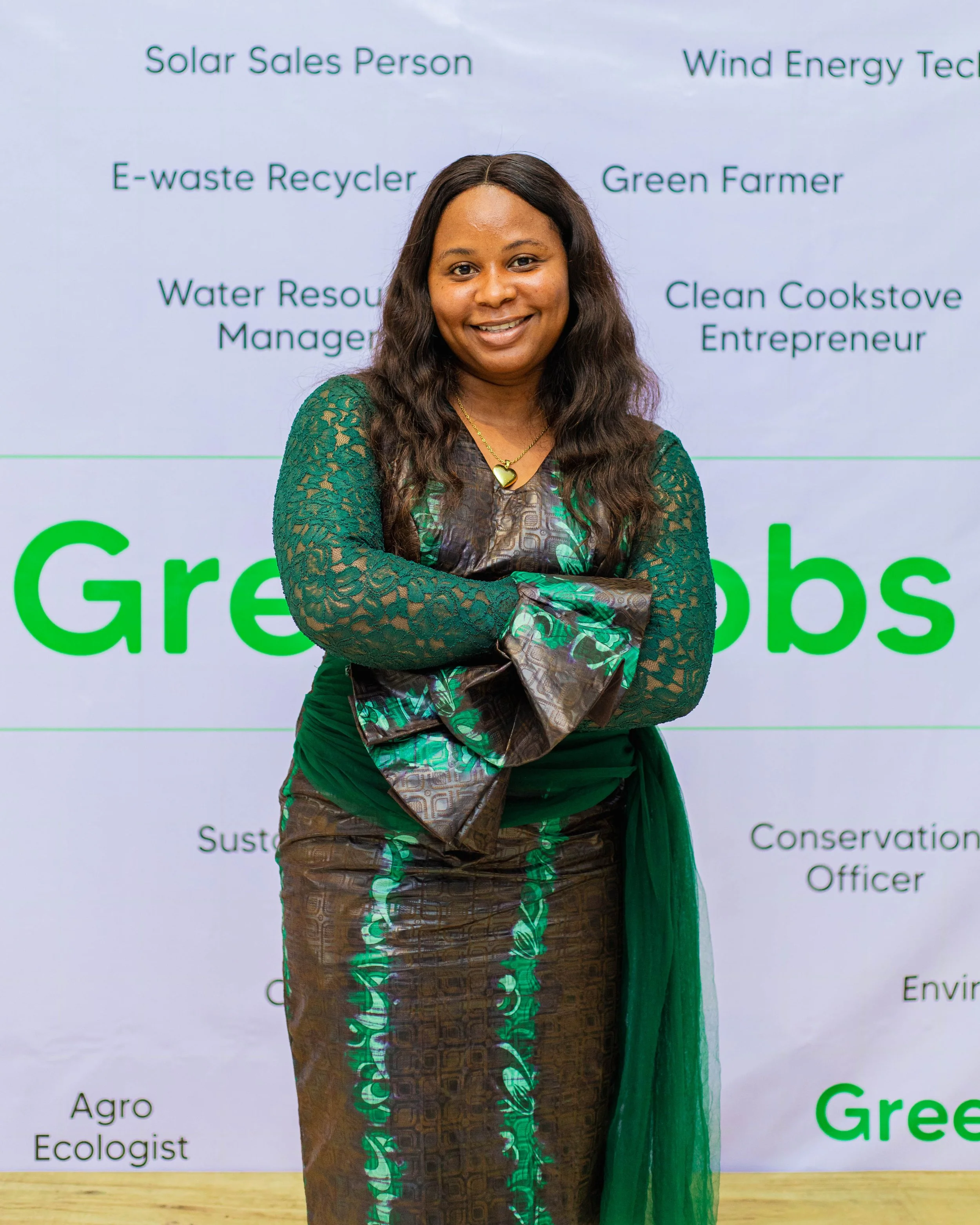Activist Spotlight: Hannah Omokhaye on Why There’s No Just Energy Transition Without Disability Inclusion
An interview with Hannah Omokhaye, a Nigerian African Climate Alliance Ambassador, who is ensuring that young people with disabilities have the skills and knowledge to be able to partake in the green economy.
Hannah Omokhaye is a Nigerian climate educator and project manager specialising in gender, disability, youth inclusion, and capacity building within the environmental sustainability sector. She is passionate about fostering meaningful youth engagement and empowering communities to drive a just and sustainable future.
Through her initiative, EcoSmart Club, she establishes environmental clubs in schools, trains teachers, and empowers young people to lead climate action. Hannah became an African Climate Alliance Ambassador in 2023 and has continued deepening his justice-centred work ever since.
In September, as part of our month of community-led climate action – featuring Cape Town Climate Week, Johannesburg Climate Week, and 8 community-based initiatives led by youth across the continent – Hannah hosted an event in Lagos focused on understanding Nigeria’s Energy Transition Plan and identifying opportunities that young people with disabilities can leverage in the green economy.
We interviewed Hannah as part of our Activist Spotlight series to learn more about her journey and her African Climate Alliance Climate Week event.
Below are some of the highlights including:
What it means to design with true inclusion in mind,
Why disability inclusion has to be at the centre of a just energy transition,
And the types of green jobs that people with disabilities can be upskilled into.
Can you tell us about your Climate Week action?
My Climate Week action was titled “GreenAbility Workshop: Unlocking Opportunities for Young People with Disabilities in the Green Economy.” It was an educational workshop and networking event that brought together over 100 young people with disabilities and green economy experts to understand Nigeria’s Energy Transition Plan and identify opportunities that young people with disabilities (PWDs) can leverage in the green economy. Some of the industries highlighted were the solar industry, upcycling, recycling, and sustainable agriculture.
The idea was inspired by my ongoing advocacy on disability rights and climate change, recognizing the need to ensure that young PWDs are not only included in the green transition but have opportunities to build green skills and access green jobs. The networking component was vital because it connected our participants with green experts who were already in the field and provided them with first-hand opportunities them to learn and network with them. It was a very successful event, and three words that best describe my experience are daring, impactful, and inclusive.
The event brought together a diverse and dynamic group of participants and partners. Out of 105 attendees, 75 were persons with disabilities. We also had sign language interpreters, school teachers, and local youth volunteers supporting the program. In addition, representatives from the National Association of Special Educators in Oyo State, civil society organizations working on youth inclusion, and several green economy experts, including solar engineers, upcycling artists, recycling companies, and green farmers, were in attendance.
Your event focused on the Climate Week theme of energy justice. Why is this so important to you?
Energy justice is important to me because access to clean, affordable, and sustainable energy is a fundamental driver of social and economic inclusion.
In Nigeria, many marginalized groups, especially young people with disabilities, are often excluded from conversations and opportunities in the energy transition. They are usually an afterthought, so by focusing on energy justice, I aim to ensure that the shift to a green economy is fair, inclusive, and leaves no one behind by empowering vulnerable communities to access green skills, jobs, and decision-making spaces in shaping a sustainable future. This convening for me was the first step in that direction.
Based on your event, what were the main learnings that came from the networking on the green economy and Nigeria’s green economy plan?
The main learnings from the networking component of the event were that opportunities in Nigeria’s green economy are expanding, but young people with disabilities often face barriers to access. Some of the barriers included awareness of the ongoing transition and how it affects the future of jobs.
The event provided participants with insights into specific green jobs, skill requirements, and pathways to engage with the Energy Transition Plan. They also learned the importance of networking, mentorship, and collaboration with experts already in the field, which can help them build skills, access opportunities, and actively participate in Nigeria’s sustainable future.
Your event was disability-led. What does this mean?
Being disability-led means that the event was designed and run by people with disabilities. Our project manager was a PWD, and 3 out of our 5 core team members were people with disabilities from different clusters, and they helped shape the agenda and ensure that their voices and perspectives were at the center of the discussion.
In addition, the event MC was a PWD as well, exciting it was her first time moderating an event, and she was fantastic. I believe this reinforces our commitment to PWD leadership, and it demonstrated on the spot to our green experts that PWDs can indeed lead solutions for an inclusive and sustainable future.
How do we ensure that people with disabilities are included in our plans for green skills and a green economy?
To ensure that people with disabilities are included in plans for green skills and the green economy, we must first recognize their ability to lead, not as beneficiaries, but as partners in shaping solutions. Inclusion must go beyond talk; it requires intentional action. This means making decisions “with them”, not “for them”. People with disabilities should be part of committees, project design, planning, implementation, and monitoring, so every program truly reflects their needs and experiences.
Equally important is capacity building, creating avenues for PWDs to develop green skills, leadership abilities, and technical expertise in fields such as renewable energy, sustainable agriculture, and waste management. Training programs must be accessible and inclusive, with barrier-free venues, adaptive learning materials, mentorship, and support systems that help them thrive.
To expand access, organizations should invest in targeted outreach and partnerships with disability organizations and PWD networks. Communication materials should also be made accessible using alt text, captions, and plain language. In fact, program designers can adopt participation targets or quota systems for PWDs.
Finally, when it comes to employment, employers and potential buyers have a big role to play. They can create inclusive recruitment processes, provide reasonable accommodations, and offer internships or apprenticeships for PWDs in green sectors. Beyond that, employers can review workplace policies to remove discrimination, ensure accessibility in the work environment, and train staff on disability inclusion. By doing this, companies not only promote equity but also benefit from diverse perspectives and talents that drive innovation in the green economy because PWDs are indeed talented.
Was there a moment during your action that stood out to you – something that made you feel proud, surprised, or hopeful?
One moment that stood out was seeing participants, many of whom had never engaged with the green economy before, confidently ask questions and share their ideas with experts. It was inspiring to witness their curiosity, creativity, and determination.
A particularly memorable moment was when one participant shared that she had always thought recycling only meant treating wastewater for reuse, but during the workshop, she learned about plastic recycling for the first time. She left excited and eager to explore opportunities in that space. Moments like that made me feel incredibly proud and hopeful, knowing the event was truly expanding knowledge and sparking new interests.
What was your biggest takeaway from the day?
My biggest takeaway from the day was that when young people with disabilities are given the right opportunities and platforms, they can engage, innovate, and contribute meaningfully to the green economy.
What kind of impact do you think your event had?
The impact of our action was both immediate and long-term. In the short term, the workshop raised awareness among young people with disabilities about opportunities in the green economy, encouraged active participation, and sparked meaningful connections between participants and green experts. Right there in the room, some partners expressed interest in inviting participants to future programs and made real commitments to include PWDs in their initiatives. One sustainable farmer even offered six mentorship slots for PWDs and provided seeds to help them start backyard farms.
A particularly exciting outcome was that five participants were invited to join the Youth Adaptation Consultation in Nigeria to commemorate Global Adaptation Day, where they contributed their insights and lived experiences on adaptation. The discussions from that consultation will even be compiled into a COP30 communique, which shows a remarkable example of inclusion in action.
In the long term, we believe this event will inspire more mentorship, training, and inclusive green programs across Nigeria, ensuring that people with disabilities have a place in shaping the country’s sustainable future.
What message would you share with other young people who want to take climate action in their own communities?
My message to other young people is: start where you are, use the skills and resources you have, and don’t wait for permission to act. Climate action doesn’t have to be big at first; small, intentional steps in your community can create ripple effects. Engage others, build partnerships, and be inclusive, ensuring that everyone, especially marginalized groups, can participate. Most importantly, be daring, stay persistent, and believe that your actions can spark real change for a sustainable future.
What was the African Climate Alliance's month of climate action?
This year in September, across 19 events and 6 countries, we connected the dots between climate change and our many social crises. We showed that the climate crisis is not just about changing weather patterns, but it’s a human rights crisis that amplifies existing inequalities. It touches our lives when it comes to how we access food, water, energy, housing, transport, and impacts gender inequity.
Simply put: for the first time, September was our month of climate action.
We hosted the fourth Annual Cape Town Climate Week, the first-ever Johannesburg Climate Week, and for the first time, eight of our African Climate Alliance Ambassadors — young climate leaders who have been through our year-long mentorship programme — hosted their own Climate Week actions in Zimbabwe, Kenya, Malawi, Zambia, Nigeria, and South Africa.
All of the events brought together activists, community leaders, students, and citizens to learn about the connections between climate change and social injustices and showcase community-led solutions proving that climate justice must include food, water, energy, spatial, and gender justice at its core.
Expanding what started as Cape Town Climate Week across the continent showed us that climate justice doesn’t belong in one place, but can be built everywhere by young people leading in their own communities.
Learn more about Cape Town Climate Week and Johannesburg Climate Week.





